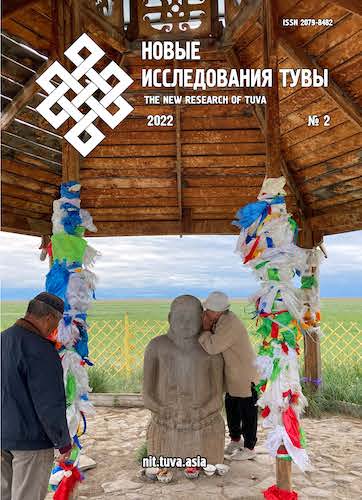Socio-economic situation in the region through the prism of ethnic identity: materials of sociological research in the Republic of Dagestan in 2020
DOI:
https://doi.org/10.25178/nit.2022.2.6Keywords:
Dagestan; ethnicities in Dagestan; ethnic self-consciousness; ethnic identity; social well-being; living standard; pandemicAbstract
The article examines the outcomes of a sociologic survey of the population of the Republic of Dagestan held in 2020 in order to investigate how people assessed the socio-economic situation in the region during the pandemic. A special focus was made on the opinions expressed by the members of the region’s leading ethnic groups. We have summed up the opinions on the economic situation both individuals and families saw themselves in, as well as what respondents thought on how to reach economic success, get a job, provide decent healthcare — and also how life felt from specifically ethnic viewpoints. Members of a number of ethnicities reflected on the current social and economic problems, on the opportunities and conditions of using native languages in communication, education, healthcare, as well as on ethnic self-consciousness and ethnic identification in times of crisis.
Not all ethnicities shared identical feelings in this situations. Avars, Dargins and Kumyks, who had been relatively dominating in social, economic and political spheres before the pandemic, saw little change. On the contrary, smaller ethnic communities, such as Russians or Azerbaijanis, saw their economic conditions worsen, especially in employment, getting a new job in their professional field or in accordance with their specialization. This led to decreased welfare and worsened social status.
The people of the region saw the overall socioeconomic situation as a little worse than satisfactory. While 1/10 of the population are convinced that they live better than their counterparts in other regions of Russia, and 1/5, on the contrary, believe that their welfare is worse than the federal average, the overwhelming majority of 70% see no difference between living standards in Dagestan and Russia’s other constituent regions.
References
Abdulatipov, R. G. (2013) Moi dagestanskii narod: istoriko-filosofskie ocherki [My people of Dagestan: historical and philosophical essays]. 2nd ed. Makhachkala, Epokha. 343 p. (In Russ.).
Avshalumova, L. Kh., Guseinov, A. G. and Osmanov, G. G. (2004) Osobennosti etnokonfessional'nykh konfliktov v usloviiakh globalizatsii [Ethnoconfessional conflicts in the context of globalization]. Makhachkala, Yupiter. 160 p. (In Russ.).
Adiev, A. Z. (2021) Obshcherossiiskaia identichnost' v Dagestane (po dannym oprosov 2016–2019 gg.) [Federal identity in Dagestan according to the surveys of 2016-2019]. Sotsiologicheskie issledovaniia, no. 2, pp. 137–142. (In Russ.). DOI: https://www.doi.org/10.31857/S013216250011312-6
Adiev, A. Z. and Biizhanova, E. K. (2019) Migratsionnye protsessy i demograficheskii resurs Dagestana: dinamika i munitsipal'nye osobennosti [Migration processes and demographic resources of Dagestan: Trends and features on the municipal level]. Vlast', no. 6, pp. 172–178. (In Russ.). DOI: https://doi.org/10.31171/vlast.v27i6.6847
Adamov, N. A. (2018) Dagestan: sotsial'no-ekonomicheskie problemy i puti ikh resheniia [Dagestan: socio-economic problems and their potential solutions]. Rossiiskii ekonomicheskii internet-zhurnal, no. 1 [online] Available at: http://www.e-rej.ru/Articles/2018/Adamov.pdf (access date: 19.01.2022). (In Russ.).
Ashuralieva, D. R. (2019) Problemy funktsionirovaniia rynka truda v Dagestane [Problems of functioning of the labor market of the Republic of Dagestan]. Herald of Dagestan State University, 3, issue 4, pp. 38–41. DOI: https://doi.org/10.21779/2500-1930-2019-34-4-38-41
Valiakhmetov, R. M. (2010) Sovremennye demograficheskie tendentsii i etnosotsial'nye problemy bashkirskogo naroda [Contemporary demographic trends and ethnosocial problems of the Bashkir people]. In: Problemy demograficheskogo razvitiia bashkirskogo naroda [Problems of demographic development of the Bashkir people] : a collection of papers presented at the round table dedicated to the III World Kurultai Bashkir / ed. by P. M. Valiakhmetov, M. M. Kul'sharipov and R. Z. Shakurov. Ufa, AN RB, Gilem. 196 p. Pp. 22–30. (In Russ.).
Gabdrakhmanova, G. F. (2016) Ob osobennostiakh etnicheskoi identichnosti tatar [On the ethnic identity of the Tatars]. Istoricheskaia etnologiia, vol. 1, no. 1, pp. 27–35. (In Russ.).
Gasanov, A. S. (2020) Sotsial'naia infrastruktura Respubliki Dagestan: sovremennoe sostoianie i problemy razvitiia [Social infrastructure of the Republic of Dagestan: current state and development issues]. Regional problems of transforming the economy, no. 9, pp. 100–110. (In Russ.). DOI: https://doi.org/10.26726/1812-7096-2020-9-100-110
Gadzhieva, Z. M. (2017) Problemy bezrabotitsy v Dagestane i puti ikh resheniia [Problems of unemployment in Dagestan and their potential solutions]. Izvestiia Dagestanskogo gosudarstvennogo pedagogicheskogo universiteta. Estestvennye i tochnye nauki, vol. 11, no. 1, pp. 97–104. (In Russ.).
Gorshkov, M. K. (2016) Rossiiskii sotsium v usloviiakh krizisnogo razvitiia: kontekstnyi podkhod (stat'ia 1) [Russian society in the conditions of crisis development: a contextual approach: Part 1]. Sotsiologicheskie issledovaniia, no. 12, pp. 26–34. (In Russ.).
Guboglo, M. N. (2003) Identifikatsiia identichnosti. Etnosotsiologicheskie ocherki [Identification of identity. Ethnosociological essays]. Moscow, Nauka. 764 p. (In Russ.).
Drobizheva, L. M. (2017) Dinamika grazhdanskoi identichnosti i ee resurs v pozitivnykh integratsionnykh protsessakh rossiiskogo obshchestva [Dynamics of civic identity and its potential in positive integration processes in the Russian community]. Monitoring of Public Opinion: Economic and Social Changes, no. 4, pp. 7–22. (In Russ.). DOI: https://www.doi.org/10.14515/monitoring.2017.4.02
Zailalov, I. I. and Zaripov, A. Ia. (2017) Etnicheskoe samosoznanie kak iskhodnyi orientir identifikatsii lichnosti v protsesse sotsial'noi adaptatsii v polietnicheskom obshchestve [Ethnic self-awareness as a starting point of personal identification in the process of social adaptation in a multiethnic society]. Etnosotsium i mezhnatsional'naia kul'tura, no. 3 (105), pp. 106–109. (In Russ.).
Lamazhaa, Ch. K. (2016) Tuvinskaia etnichnost' i sotsium v etnopoliticheskikh i antropologicheskikh issledovaniiakh [Tuvan ethnicity and the society in ethnosociological and anthropological studies]. New Research of Tuva, no. 2, pp. 32–51. (In Russ.).
Magomedov, G. N. (2015) Etnokul'turnye i etnopoliticheskie problemy sovremennogo Dagestana [Ethnocultural and ethnopolitical problems of modern Dagestan]. Vlast', no. 7, pp. 62–67. (In Russ.).
Muduev, Sh. S. (2018) Sovremennoe sostoianie, problemy sotsial'no-ekonomicheskogo razvitiia Respubliki Dagestan i puti ikh resheniia [The current state, problems of socio-economic development of the Republic of Dagestan and ways to solve them]. UEPS: upravlenie, ekonomika, politika, sotsiologiia, no. 2, pp. 50–60. (In Russ.).
Semedov, S. A. and Maluchiev, G. S. (2018) Dagestanskaia svad'ba kak proiavlenie filosofii «obshchestva potrebleniia» [Dagestan wedding as a manifestation of the philosophy of “consumer society”]. Etnosotsium i mezhnatsional'naia kul'tura, no. 9 (123), pp. 70–84. (In Russ.).
Sikevich, Z. V. (2011) Etnicheskii faktor v rossiiskom obshchestve. Sotsiologicheskie ocherki [The ethnic factor in Russian society. Sociological essays]. Saarbrϋcken, LAP LAMBERT Academic Publishing. 188 p. (In Russ.).
Tishkov, V. A. (2010) Natsional'naia identichnost' i dukhovno-kul'turnye tsennosti rossiiskogo Naroda [National identity and spiritual and cultural values of the Russian people]. St. Petersburg, SPbGUP. 36 p. (In Russ.).
Shakhbanova, M. M. and Abdulagatov, Z. M. (2016) Tipy sotsial'noi identichnosti v massovom soznanii dagestanskikh narodov: sostoianie i dinamika [Types of Social identity in the Mass consciousness of Dagestan peoples: state and dynamics]. Ekonomika narodonaseleniia i demografiia, no. 7, pp. 55–64. (In Russ.).
Cheshko, S. V. (2017) Rossiiskaia natsiia [The Russian Nation]. Vestnik antropologii, no. 1(37), pp. 144–147. (In Russ.).
Published
How to Cite
For citation:
Zaripov A. Ya., Huseynov A. H. and Maluchiev G. S. Otsenka sotsial’no-ekonomicheskogo polozheniia regiona cherez prizmu etnicheskoi identichnosti (po materialam sotsiologicheskogo issledovaniia v Respublike Dagestan v 2020 g.) [Socio-economic situation in the region through the prism of ethnic identity: materials of sociological research in the Republic of Dagestan in 2020]. New Research of Tuva, 2022, no. 2, pp. 85-101. (In Russ.). DOI: https://www.doi.org/10.25178/nit.2022.2.6
Issue
Section

This work is licensed under a Creative Commons Attribution-NonCommercial 4.0 International License.

Author(s) license holder(s) grant rights for their work to the journal (grantee of a license) under the simple non-exclusive open license in accordance with Art. 1286.1 «Open license for a research work, work of literature or fine arts», Civil Code of the Russian Federation.
New Research of Tuva publishes articles under the Creative Commons Attribution-NonCommercial license (CC BY-NC).
Since it is an open license, author(s) reserve the right to upload the article to their institutional repository, submit it to another journal (if it allows republications), or republish it on their own website (in full, or in part).
However, several conditions apply here:
a) The republished version must always contain the name(s) and affiliation(s) of the author(s), the original title and the hyperlink to the original version on the New Research of Tuva website;
b) It must be in open access, free of charge, and no category of readers must be in any way whatsoever advantaged over general readership.
c) should the contribution be submitted elsewhere by its author(s) without substantial modification (30% or more of original text unchanged), the body of the article should contain a disclaimer that the original version was published in New Research of Tuva (with a link to the respective page)
The CC-BY-NC is a non-revocable license which applies worldwide and lasts for the duration of the work’s copyright.











